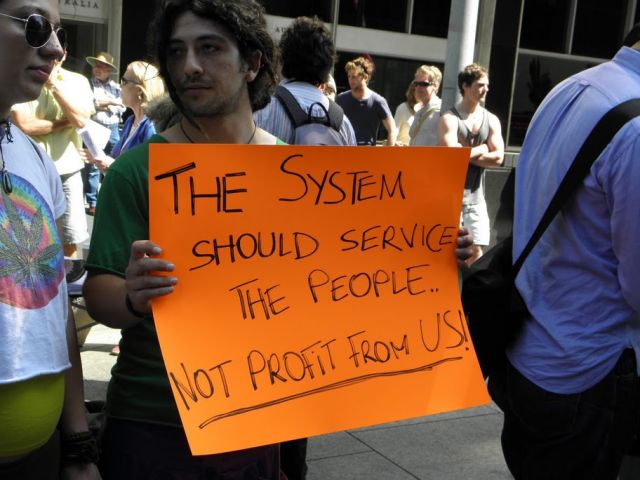
The global Occupy movement has focused the spotlight on the 1% versus the 99%. Who are the 1%? In the United States, the 400 richest individuals have as much wealth as the bottom 150 million. A similar picture applies in all the large capitalist countries.
Economy owned by the 1%
The source of their power derives from their ownership and control of society’s economic infrastructure. A relative handful of people own the means of production, distribution and exchange. They own the corporations that own the mines, factories, banks, transport networks, supermarket chains, media empires, and so on.
This is monopoly capitalism. Each sector of the economy is dominated by a few giant corporations. They are continually engaged in ruthless competition — against each other and against their workforces.
The concentration of economic power is rising. In Australia, Coles and Woolworths account for 75% of grocery and liquor sales. The German giant Aldi is steadily pushing in. Coles’ parent company Wesfarmers owns the huge Bunnings hardware chain, and Woolworths intends to open its own chain to rival it.
Capitalist apologists will at times trumpet that we have a “shareholder democracy”. This is patently false. Some ordinary people may have shares to augment their basic income but they control nothing; their investment is just a cheap loan to the company. Real control remains completely with the 1%.
Working class
Ordinary people have to work for the corporations of the 1%. Most of the population in countries like Australia and the US have to work for a living — they are the working class. A still substantial number are state employees, but their environment is an increasingly corporatised, profit-driven one.
The modern working class is very diverse. It ranges from a Vietnamese woman outworker sewing garments for miserable piece rates in her living room to a highly skilled welder earning more than $100,000 a year on a big infrastructure project.
Who creates the wealth
The Rupert Murdochs, James Packers, Gerry Harveys, Gina Rineharts, Andrew Forrests and Frank Lowys dominate the headlines, but behind each of these pillars of the 1% is an army of workers whose stolen labour makes up their profits.

The economy is a social enterprise. We all depend on it and the labour of working people keeps the wheels turning. But because the 1% own the bank, factory, mine, freight company or supermarket they get the profits. The workers get wages and, as we know, getting a decent wage is a constant struggle against entrenched corporate power backed by the state.
There is an alternative
The media constantly parrots the phrase “the markets”. This is code for profit-crazed capitalists and greedy speculators. The economic universe we are presented with excludes any alternative. This is simply self-serving ideological rubbish.
Our economic and social relationships are a human construct, not an act of God. They can be changed.
Capitalism arose out of the historical process. Its rise was marked by ferocious struggles — against the old feudal order, against working people and against people in other countries that resisted colonial conquest.
Economy should be socially owned
The Occupy movement is assailed by establishment critics who ask: what are our demands? But clearly what we want is a world where there is no 1% dominating society.
Socialists say the only way this can happen is if the economy is brought under social ownership and control. The commanding heights of the economy should be publicly owned (whether federal, state, municipal or cooperative).
With the economic levers in the hands of the people, there would be a conscious focus on meeting human needs. Combating climate change and building a sustainable economy would be the most urgent priority.
Plans would be democratically decided. Workplaces would be controlled by their employees. There would be no obscenely overpaid CEOs and insecure badly paid workers.
This is the socialist perspective. It will take a big, united and prolonged struggle to overcome the entrenched power of the 1%, but there truly is no alternative. Either we overcome them or they will destroy the planet and most of us along with it.
[A collection of Dave Holmes’ articles and talks can be found at his blog.]